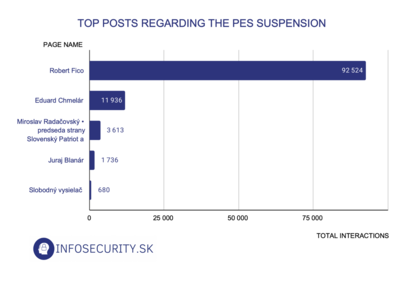DISINFORMATION
The decision of European socialists to suspend Slovak ruling parties sparks accusations of blackmailing and authoritarianism

- Following the suspension of SMER-SSD and Hlas-SD from The Party of European Socialists (PES), political actors in Slovakia deliberately distort the PES statement and portray themselves as victims of “authoritarianism”.
- The designation of the SNS as far-right by PES sparks outrage among its members and supporters, leading to efforts to refute the claims, including social media posts and statements from the party's chairman.
- Additionally, Slovak political parties are intensifying their opposition against non-governmental organizations (NGOs), spreading negative rhetoric and proposing labelling them as "foreign agents," which echoes practices in authoritarian countries.
The new ruling Slovak parties criticize the Party of European Socialists
The Party of European Socialists (PES), Europe's Socialist umbrella group, has suspended both incoming Slovak Prime Minister Robert Fico's Smer-SSD, the winner of the recent election, and its coalition partner, Peter Pellegrini's Hlas-SD, after they announced that they would form a coalition with the far-right Slovak National Party (SNS).
The reason is, according to an official statement by PES, a “clear divergence from the values” of the group, which included criticizing the military aid to Ukraine, hostile rhetoric regarding migration and marginalized communities as well as the association with the far-right SNS.
SMER-SSD politicians and their supporters commented on the measure on social media, with a majority of them deliberately misrepresenting the PES statements to suit their own agendas.
The most popular post regarding this issue was made by the chairman of the party Robert Fico, who in a 3-minute long video proceeds to accuse PES of “blackmailing” SMER-SSD as well as calling the reasons for the suspension “undemocratic” and “authoritarian”. According to Fico, the party is facing criticism solely because it uses a rhetoric that is not aligned with the official positions of the USA.
Furthermore, Juraj Blanár, a member of the party who is rumoured to become a new minister of foreign affairs, claimed that PES suspended the membership of SMER-SSD for “forming a pro-Slovak government”.
This tactic of bending the definition of sovereignty as well as defending pro-Russian ideas and discriminatory rhetoric behind autonomy and free speech is nothing new when it comes to populist and radical actors in Slovakia. What these actors are doing is exploiting these concepts and stretching the boundaries of free speech in order to further their own agenda, which is often harmful and manipulative.
Additionally, they are trying to portray themselves as victims of political correctness, for which, in this case, they also abuse the notions of nationalism. However, it is important to note that they are not genuinely concerned with democracy or free speech, since they do not provide the same privilege of expressing and accepting all views to actors who oppose them.
Political actors are protesting the designation of the SNS party as “far-right”
In the Slovak information space, especially among the affected political actors, the topic of the suspension of SMER-SSD and Hlas-SD by PES resonated for other reasons as well. In their statement, the PES declared that forming a coalition with the far-right SNS was a potential risk. This designation of the SNS as far-right outraged members of the party and their supporters. Consequently, they sought to refute the claims.
The official Facebook account of the SNS rejected the statement by claiming that the designation is “nothing but a creation of the Party of European Socialists, which tries to feed the public plain hatred on the basis of an imaginary label”. The same statement has also been posted by the party’s chairman Andrej Danko.
Miroslav Radačovský, an MEP, also took to social media to criticize the decision. He states that calling SNS far-right is not “logical” because the party has never been associated with any of the notorious far-right radical parties such as ĽSNS or Republika. Radačovský also claims that the party’s chairman has “never made disparaging or hateful comments about people of other sexual orientations, Roma, or other nations and nationalities”.
Contrary to Radačovský’s statement, the party made several statements using harmful terminology against the LGBTQ+ community, presenting it as a “gender ideology” imported from the West, as did its chairman. The same applies to remarks about “other nations and nationalities” and migrants. The SNS party is also notoriously known for propagating anti-Ukrainian and pro-Russian sentiments.
It is because of the mentioned rhetoric that the designation of the party as far-right is not at all misguided as these actors try to present it to be. In light of the rhetoric used and the ideas propagated through official statements and the party’s social media as well as considering the fact that the MPs for the SNS are not the party members but come from the far-right ĽSNS party, it is a very logical conclusion.
Since the suspension of the SMER-SSD and Hlas-SD membership by PES was one of the biggest topics in Slovak information space in the past two weeks, we also looked at it through an optic of a list of disinformation actors in Slovakia. We used the CrowdTangle analysis tool to analyze the most popular posts on Slovak Facebook that include the keywords “European Socialists” (“európski socialisti”) and “membership” (“členstvo”). Posts were evaluated based on the total number of interactions (the sum of all reactions, comments, and shares).

The first post belongs to the aforementioned post by Robert Fico, in which he accuses the PES of being “undemocratic” and “blackmailing” the SMER-SSD party.
The second place belongs to a post made by a dubious political commentator Eduard Chmelár. In the post, he openly criticizes the decision to suspend the membership of SMER-SSD and Hlas-SD. Furthermore, Chmelár even went so far as to personally insult Stefan Löfven, claiming that the PES’ president is “delusional”, has a lack of education and that “he was tormented all his life by the fact that he grew up in an orphanage and his mother didn't want him even as an adult”. To stoop to personal insults is not only extremely inappropriate, but it also demonstrates the lengths some disinformation actors go to assert their arguments.
The third place belongs to the aforementioned post by an MEP Miroslav Radačovský, in which he defends the SNS and calls the designation of the party as far-right “not logical”.
The fourth place belongs to the already-mentioned Facebook post by Juraj Blanár, in which he says that the PES suspended the party because they are forming a “pro-Slovak” coalition.
The last place belongs to a disinformation site Slobodný vysielač (“Free broadcaster”) that has re-shared the aforementioned post made by Eduard Chmelár.
Political actors amplify their hateful rhetoric towards NGOs
Throughout their election campaigns, members of political parties were noticeably active in their opposition against NGOs and steadily spread false narratives or overall negative rhetoric regarding these organizations. In the vast majority of cases, NGOs were also being linked to malign foreign influences, which is a tactic meant to portray them as a risk to the sovereignty of Slovakia and therefore reduce their public support and suspend their funding.
In the past two weeks after the elections, the winning SMER-SSD party, which is now on its way to forming a new government and has been one of the most vocal in spreading disinformation about NGOs, started to intensify its efforts to alienate the non-governmental actors. Recently, the chairman of the party Robert Fico claimed that “the era when NGOs ruled this country [Slovakia] is over” and declared his intention to change the legislation regarding NGOs saying, that as long as these organizations operate in Slovakia and receive funding from abroad, they have to be labeled as "foreign agents".
This rhetoric garnered support amongst Slovak disinformation actors. Following Fico’s statement, the disinformation site Neverím falošným politikom (“I do not trust fake politicians”) echoed his sentiment by saying that “political NGOs need to be chased out of Slovakia”. Slobodný vysielač (“Free broadcaster”) posted a video of Fico’s aforementioned declaration and in the caption wrote: “If we mention the NGOs that have ruled so far, we are talking about POLITICAL NGOs.”
Regarding this narrative, it is important to mention that no NGOs have ever “ruled” Slovakia, and neither do they have the power to do so. NGOs and their activities are regulated by law and controlled by state authorities, which makes statements about their vast influence on public and state affairs untrue and highly manipulative.
Furthermore, the action of dividing NGOs into political and non-political in order to control them or stop their funding or labelling them as “foreign agents” is reminiscent of the practices of authoritarian regimes such as Russia against the nongovernmental sector, which aims to silence any non-state opposition. In the wake of the SMER-SSD party winning the elections, this rhetoric can be seen as highly dangerous.
Project Infosecurity.sk organized by Adapt Institute, which is supported by the Prague office of the Friedrich Naumann Foundation for Freedom, continuously monitors the activities of both Slovak and foreign disinformation actors, but focuses mainly on the former. The project activities are built upon daily monitoring of emerging disinformation, hoaxes, and conspiracy theories in the online information space. This approach allows the analysts to identify disinformation posts and narratives that resonated with the public the most, as well as to find out where they originated, and how they spread and evolved on social media. The report takes the form of a bi-weekly summary of arising trends in the spread of malicious information content online. Based on that, Infosecurity.sk can warn the public about emerging and current trends in the field of disinformation, manipulation, and propaganda.

